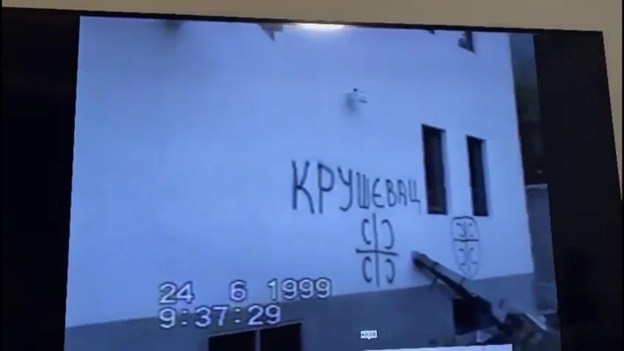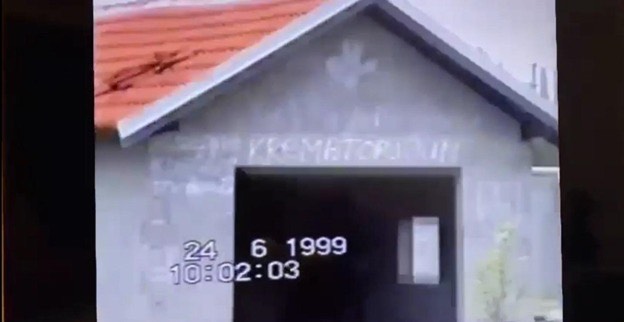It’s been one year since Russia invaded Ukraine, bringing back the feelings of war to the old continent. The last time Europe saw war was two decades ago, when Kosovo was the last domino in the chain of Yugoslavia’s fall. The two countries share solidarity and have more in common than people realize.
Russia’s unprovoked and unjustified full-scale invasion of Ukraine soon marks one year, and remains one of the most widely discussed topics in international politics.
Images of invasion, dehumanization, displacement, but also of resistance and survival, continue to appear in the media. While the West has committed itself to maintaining its support for Ukraine, Kosovo has also done its part.
That is not only because of Kosovo’s pro-European stance but also because Kosovar Albanians understand very well what Ukrainians are going through.
Last February, footage of Ukrainians fleeing their homes reminded Kosovar Albanians of their own exodus at the turn of the century. In Kosovo, the war in Ukraine has awakened memories of the 1998-99 war.
In a strong display of solidarity, Kosovo organized protests in support of Ukraine. The government offered to host Ukrainian refugees, is hosting Ukrainian journalists, and joined NATO states in sanctioning Russia.
Many wonder where this solidarity comes from, as Ukraine does not recognize Kosovo and there is virtually no political or economic interaction between them.
Despite this, the recent war has revealed the parallels between these two historically oppressed nations. What Russia is to Ukraine, Serbia has been to Kosovo.
The historical similarities are remarkable. Just as Serbian nationalist historiography views Kosovo as its “Jerusalem,” Russian nationalism considers Ukraine the birthplace of the Russian nation. Such ahistorical views have led to violent oppression in Kosovo and Ukraine by Serbia and Russia, respectively.
For example, not only did Ukrainians suffer Stalin’s collectivization programs and the great famine in the interwar period, but their language and culture were also suppressed. Likewise, as historian Noel Malcolm writes in his Kosovo: A Short History book, after the Ottomans lost their European territories, Serbia colonized Kosovo by moving settlers there, plundering their land, denying them religious and language rights, expatriating them, and killing tens of thousands of Albanians.
From 1937 to 1941, Serbia even established a program for the expulsion of 200,000 Albanians to Turkey. Only World War II prevented it from happening. With such large-scale oppression and systematic discrimination in the interwar period, it is not surprising that some Ukrainians and Kosovo Albanians perceived the Axis troops as potential liberators, historian Bernd Fischer explains in his Albania at War 1939-1945 book.
Furthermore, the ongoing developments in the war in Ukraine indicate that there are similarities in Russia’s and Serbia’s war tactics, aimed at dehumanizing their victims. As American journalist Jeffrey Smith, who reported for the Washington Post during the Kosovo war, wrote: “History is now repeating itself in Ukraine.”
Apart from massacres, mass rape, and the flight of refugees, there is evidence that both colonial powers have engaged in biological warfare, throwing Ukrainian and Kosovo Albanian corpses into wells in order to make the environment unlivable.
In addition, Ukrainian and Kosovo Albanian prisoners were forced to sing Russian and Serbian nationalist songs as a form of humiliation.
Kosovar Albanian former prisoners in Serbian prisons say they were tortured by the Serbian guards and forced to sing the famous Serbian nationalist song “Ko to kaze, ko to laze, Srbija je mala [Who is saying, who is lying that Serbia is small].”
Russian soldiers have been doing the same to Ukrainian prisoners of war. A Ukrainian held captive in a Russian prison in Kursk in April 2022 recalled that Ukrainian prisoners had to “get up at 6am, bend down to 90 degrees, sing the Russian national anthem while facing the floor, and after breakfast, were forced to sing songs dedicated to Putin.”
Furthermore, Russians and Serbs left nationalist graffiti on places they occupied.
After returning to our hometown following the end of the war, my family’s house was burnt and full of Serbian nationalist graffiti.

Istog, Kosovo. June 24, 1999. Graffiti stating the name of the town of Krusevac, Serbia, indicating the origin of the Serbian paramilitary troops who were in Istog during the war, along with the infamous Serbian nationalist symbol “4C” – cyrillic for “4S” – meaning “only unity will save the Serbs.” This photo is part of a longer video taken by a member of the Loshaj family from Istog.

Istog, Kosovo. June 24, 1999. Graffiti stating “this is a crematorium” in Serbian, along with the three-finger salute – another symbol often used as a gesture of Serbian supremacy and nationalism. This photo is part of a longer video taken by a member of the Loshaj family from Istog.
And there are similarities in the way both Russia and Serbia characterized their war intentions.
Just as Serbia’s then leader Slobodan Milosevic claimed that Serbs in Kosovo were oppressed by local Albanians, Putin has instrumentalized the image of allegedly oppressed Russians in Ukraine as another justification for his war.
Even now, Serbian President Vucic follows Milosevic’s patterns and, though he claims he wants to support Kosovo Serbs, uses them as a tool to cause tension in Kosovo.
On another note, not only have Serbia and Russia oppressed Kosovo and Ukraine respectively, through genocidal wars but they also try to disrupt their international objectives.
Serbia and Russia’s colonial aspirations are challenged by Kosovo and Ukraine’s desire for Euro-Atlantic integration for different reasons.
Serbia fears that Kosovo’s membership in the EU and NATO would signal the definite “loss” of Kosovo. Hence, it lobbies for the derecognition of Kosovo, prevents Kosovo from joining INTERPOL and UNESCO and protests against Kosovo’s application for EU membership.
Similarly, Russia fears Ukraine’s membership in the EU would end Moscow’s influence, worrying that a Ukrainian pivot towards Brussels would ultimately lead to membership in NATO, which Russia would see as a serious threat to its security.
Therefore, it is not surprising that both Serbia and Russia portray themselves as victims vis-a-vis the West.
While Kosovo expresses solidarity with Ukraine, in Serbia, pro-Russian rallies take place, and the Serbian government still refuses to sanction Russia and signs coordination agreements with Moscow.
It is clear that the shared experience of historical oppression and war has produced sympathy between Kosovo and Ukraine. In a Parliamentary Assembly of the Council of Europe, Ukrainian MP Oleksiy Goncharenko appealed to the Council of Europe to recognize Kosovo. In an unforgettable gesture, he concluded his speech in Albanian as an act of solidarity. In fact, Goncharenko’s Party initiated a petition for Ukraine to recognize Kosovo as an independent state.
Similarly, at the same CoE Assembly, Kosovo’s Deputy Head of Assembly, Saranda Bogujevci, a survivor of a massacre in the Kosovo war, voiced her support for Ukraine. She expressed how Kosovars understand what Ukrainians are enduring. She, too, displayed an act of solidarity by concluding her speech in Ukrainian.
While it is difficult to predict when or how the war in Ukraine will end, Kosovo will hopefully continue its support of Ukraine even though the latter does not recognize Kosovo.
Assuming Russia loses the war, post-war Ukraine will likely recognize Kosovo for at least three reasons. First, Kosovo has provided endless moral and humanitarian support for Ukraine during the war. Second, a post-war Ukraine will likely be encouraged to recognize Kosovo due to its political ties with the US and the EU. And third, Ukrainians may recognize the similarities they share with Albanians in their historical struggles for self-determination; they are both victims of aggression by two countries closely linked to each other.
Jeta Loshaj is currently pursuing an MA degree in Russian and East European Studies at the Robert F. Byrnes Russian and East European Institute at Indiana University Bloomington, USA. She previously worked in several civil society organizations such as the Friedrich Ebert Stiftung Prishtina Office, Council for Inclusive Governance, and BIRN Kosovo, and also completed internships at the German Bundestag, UNDP Kosovo, the Millennium Challenge Corporation Kosovo, and the German-Kosovar Business Association.
The opinions expressed are those of the author only and do not necessarily reflect the views of BIRN.





